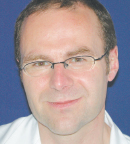
In the world of evidence-based medicine, the results of our trial do not support the use of rituximab maintenance therapy for 5 years in patients with follicular lymphoma. Based on the PRIMA trial, we stick to a duration of 2 years after first-line therapy.— Christian Taverna, MD
Tweet this quote
Christian Taverna, MD, a lymphoma specialist at the Hospital Münsterlingen in Switzerland, commented on this patient series for The ASCO Post. He noted that the Swiss Group for Clinical Cancer Research (SAKK) tried to address the question of the optimal duration of rituximab (Rituxan) maintenance in patients with follicular lymphoma, in the randomized, controlled phase III SAKK 35/03 trial.1
The study, which Dr. Taverna led, enrolled 165 untreated, relapsed or chemotherapy-resistant patients who achieved at least a partial remission after induction therapy with 4 weekly doses of single-agent rituximab. Patients were randomized to receive short-term (every 2 months for 4 treatments) rituximab maintenance or long-term (every 2 months up to 5 years) rituximab maintenance.
“The trial did not meet its primary endpoint, which was event-free survival,” he noted. After a median follow-up of 6.4 years, there was also no difference in overall survival, but progression-free survival was improved by long-term maintenance (7.4 vs 3.5 years; P = .04). “Half the patients in the long-term maintenance arm were still in remission 7 years after starting maintenance treatment,” he said. “Although we did observe more adverse events in the long-term maintenance arm, they were mainly grade 1 or 2, and we can conclude that long-term maintenance for a maximum of 5 years is safe.”
Optimal Patient Selection Is Key
Why was SAKK 35/03 a negative trial, and what were the differences from Dr. Auerbach’s retrospective analysis of 25 consecutive patients? “Dr. Auerbach included only previously untreated patients with low-grade high tumor–burden follicular lymphoma,” revealed Dr. Taverna. “In the SAKK trial, also patients with relapsed and chemotherapy-resistant follicular lymphoma of all grades were included. One principle of the ‘art of medicine’ approach is the selection of the optimal therapy for the right patient.”
Elaborating on this principle, Dr. Taverna further noted that there were 52 events in SAKK’s short-term maintenance arm and 43 events in the long-term maintenance arm. However, the first 8 months after randomization, when treatment was the same per arm, “there was a clear difference in early events, which consisted mainly of disease progression or relapse (3 in the short-term arm and 10 in the long-term arm). This led to an early separation of the survival curves favoring short-term maintenance,” he said.
“This imbalance in early events may be explained, at least in part, by slightly more adverse prognostic factors (elevated lactate dehydrogenase, extranodal involvement) in the patients in the long-term maintenance arm. Also, here we can conclude that optimal patient selection is key for achieving optimal treatment results,” he commented.
“In the world of evidence-based medicine, the results of our trial do not support the use of rituximab maintenance therapy for 5 years in patients with follicular lymphoma,” Dr. Taverna said. “Based on the PRIMA trial, we stick to a duration of 2 years after first-line therapy.” ■
Dr. Taverna is a lymphoma specialist in the Division of Medical Oncology at the Hospital Münsterlingen in Switzerland.
Disclosure: Dr. Taverna has served as a consultant or advisor to Roche and Celgene.
Reference
1. Taverna C, Martinelli G, Hitz F, et al: Rituximab maintenance for a maximum of 5 years after single-agent rituximab induction in follicular lymphoma: Results of the randomized controlled phase III trial SAKK 35/03. J Clin Oncol 34:495-500, 2016.


